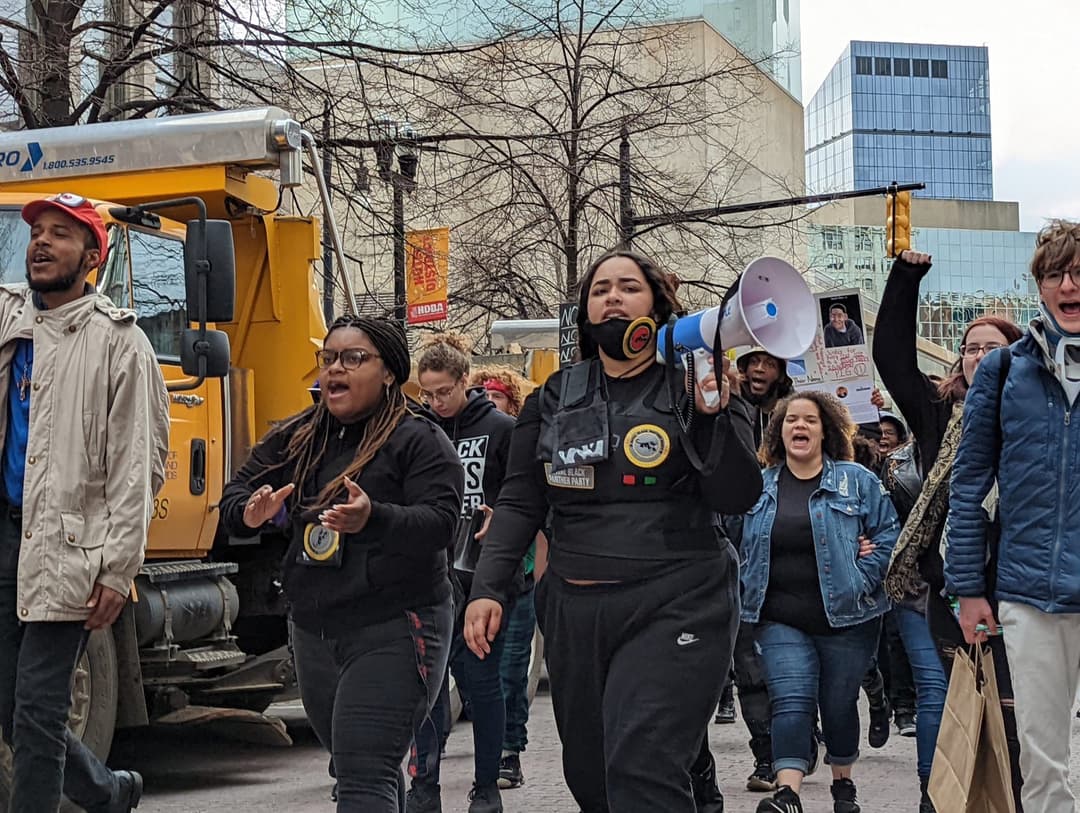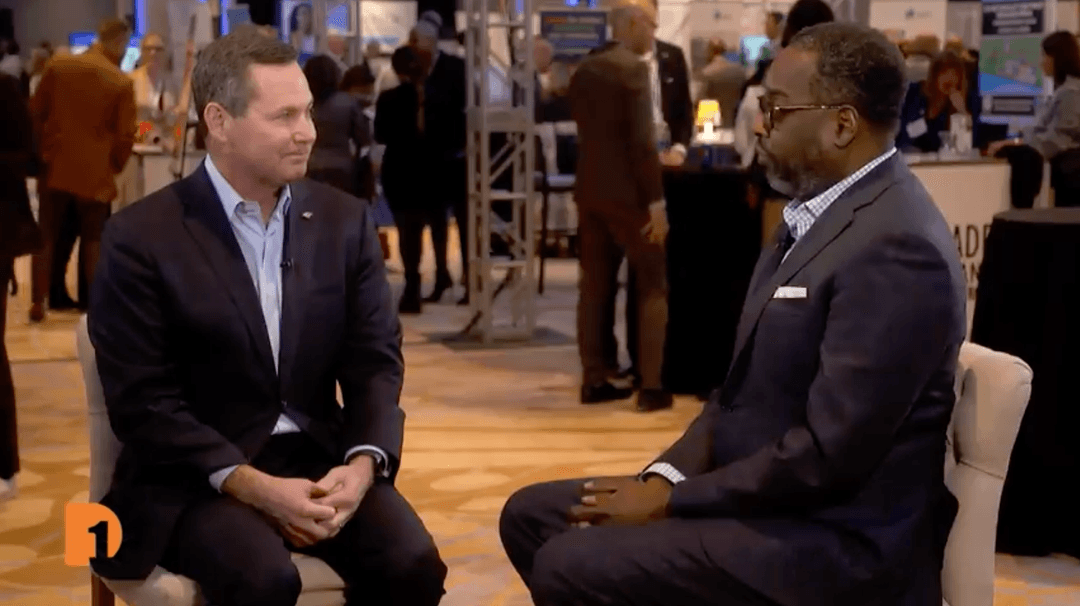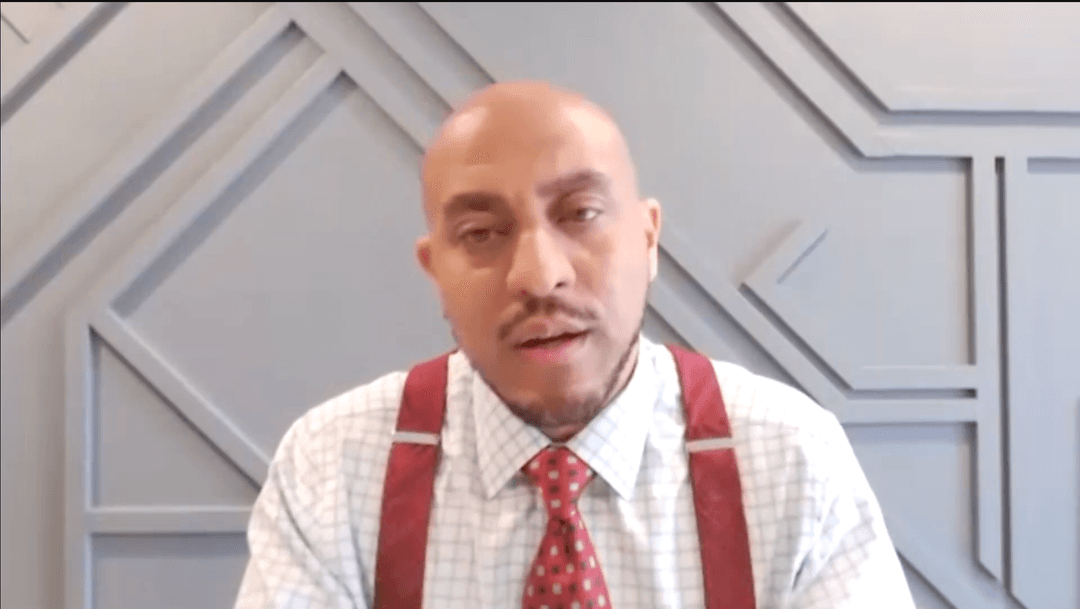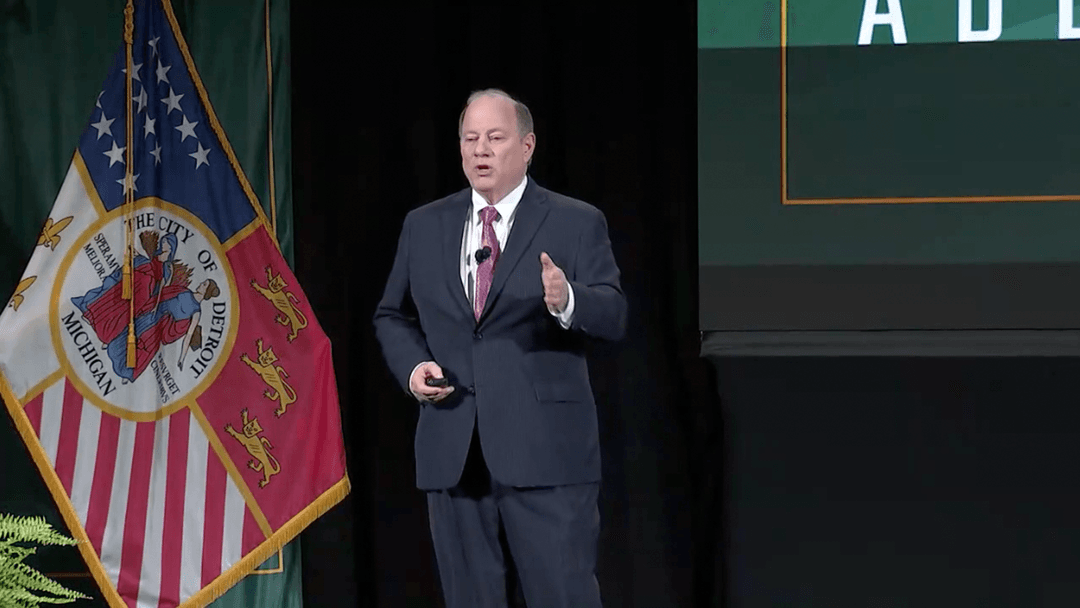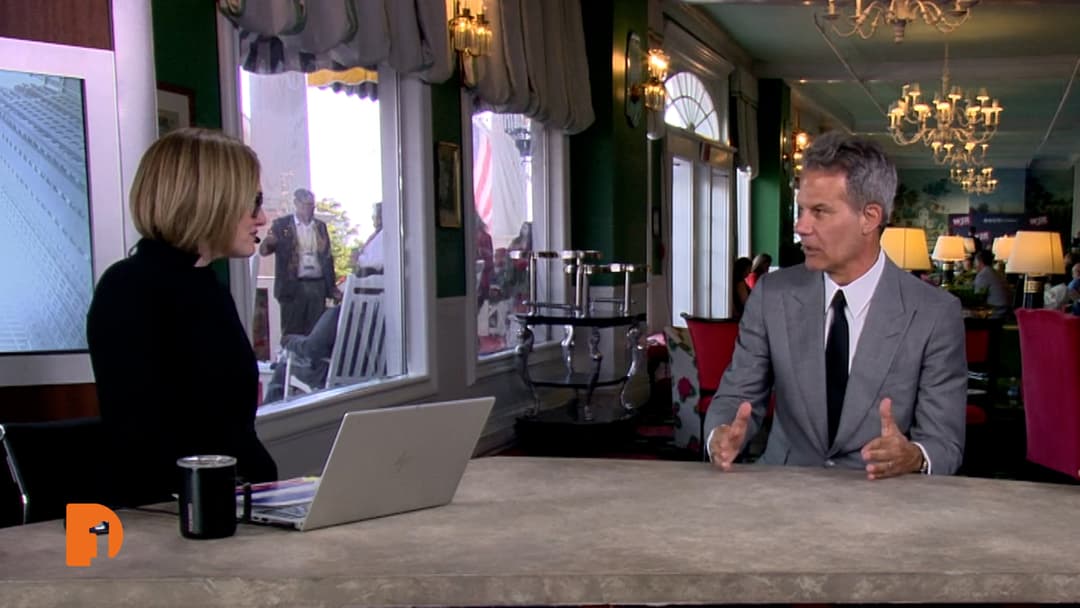Deep Cover: The Drug Wars
Oct 9, 2020
Detroit PBS’s Marty Fischhoff interviews Pulitzer Prize winning journalist, Jake Halpern, about his first podcast, “Deep Cover: The Drug Wars.”
A Detroit FBI agent goes undercover in an outlaw motorcycle gang to investigate a twisted web of drug smugglers and drug dealers. Along the way, listeners get to meet an odd cast of characters, and ultimately find out how the twists and turns lead to the U.S. invasion of Panama.
Read full transcript
Marty Fischhoff, DPTV Today One Detroit is talking to Pulitzer Prize winning journalist and best selling author Jake Halpern about his first podcast. It’s called “Deep Cover the Drug Wars” and it is quite a tale. It’s about a Detroit FBI agent who goes undercover in an outlaw motorcycle gang to investigate a twisted web of drug smugglers and drug dealers. It’s a network of bizarre characters in a story that ends up in President George H.W. Bush ordering the US invasion of Panama. What a plot Jake, welcome to One Detroit.
Jake Halpern, Author & Journalist Hey, thanks for having me, Marty.
Marty Fischhoff, DPTV Can you tell us how you first came across Ned Timmins, the FBI agent in his crazy saga?
Jake Halpern, Author & Journalist Yeah, we have a mutual… Ned… And I had a mutual friend who’s a producer out in Hollywood named Jeff Singer. And Ned had written a novel based very closely based on the true experience that he’d had as an undercover FBI agent. And somehow or another, Jeff managed to get a hold of this novel. And he read it and thought that it would be could be a movie or a podcast or something. He called and said, Jake, you got to read this. It’s kind of incredible. So I read the novel and I said, yeah, Jeff, this is this is a crazy tale, you know? This is mostly the secret reason that we invaded Panama because this FBI agent, you know went, undercover and the Detroit drug gangs and found out that Noriega was a dealer. I said, but. But is it true? And he said, yeah. This guy Ned says it’s true. But as you know, as a journalist, we can’t just take someone’s word for it. And I went to meet Ned, and that started this year and a half long odyssey that I went on to try to figure out. Is this story true? And how did it really go? And have traveled the world and talked to dozens of folks, basically fact checking and telling the true version of the story.
Marty Fischhoff, DPTV You know, you were a celebrated investigative journalist in Miami saying that we took all that skill and experience to be able to distinguish fact from fiction to what you’re being told. How do you go about verifying with the information you had?
Jake Halpern, Author & Journalist I mean, it’s a great question. And I kind of felt like it was reminding me. I say this on the podcast, but on an on vacation, when you’re kids empty, like 5000 pieces puzzle out on the floor, you think, like, you’ve got to be kidding me. But then you see the corner piece and the edge piece, the connect and you’re like, huh? And then and then you’re hooked. So I felt that way. There were all these Ned drop dropped all this information on me. And I started to feel like I had to put the pieces together. But where I got very lucky was Ned had left the FBI and become a private eye. And Ned said, oh, I can help you track down all the people that I knew. Thirty years ago when I was in the middle of the saga and some of the people who’d actually stayed in touch with and again, I was skeptical, really. And then sure enough, he started putting me in touch with the guys he’d arrested, the agents that he’d served with, bikers we knew back then. And I thought, okay, this is a good start. And then I got to find court records and then I have to get FBI files enough to file Freedom of Information Act. And and all those pieces of the puzzle started landing. And then me and a team of producers began putting them together. And the podcast is is the result of that effort.
Marty Fischhoff, DPTV Yeah, I know. I think one of the cool things about the podcast that works and so there’s interviews is what Ned tells you is you conduct yourself, the media coverage of the time. And it’s a novel based on does a detective work and mean it take a lot of work to go to piece it together in the way you did.
Jake Halpern, Author & Journalist Yeah, it was fun. What we decided to do was because the novel was a lot of fun to read. So Ned had written this novel about this crazy saga where he’s undercover with the biker gangs and and blows open in this drug smuggling business that exposes Noriega and leads the invasion of Panama. So he has the novel. Right. And that novel is kind of like my I’d say, unreliable roadmap, like it generally has the roads and the geography. But stuff has been fictionalized here and there. And so I’m constantly basically fact-checking the novel, but also using the novel to say, hey, Ned, the drug dealer that ran the warehouse in an eight mile. Like, do you tell me how I can find this guy. And so I would use that novel. And then somewhat realize you know what? The novel is so fun. Let’s make that part of the podcast. So we actually hired the actor Walter Goggins from Justified and Sons of Anarchy.
Marty Fischhoff, DPTV He’s a great actor. Yeah.
Jake Halpern, Author & Journalist He reads the novel. And so you’re kind of like you’re there with me. You’re like you hear the novel and they’re like, okay, what did this? How much of this is true? And then you go into the investigative you know.
Marty Fischhoff, DPTV It’s such a picaresque tale. Can you tell us a little bit about the cast, the characters, these crazy characters that the listeners will meet if they listen in the podcast?
Jake Halpern, Author & Journalist Absolutely. So, Ned, what happens with Ned is he ends up flipping a biker who is kind of an outlaw biker, kind of a criminal and a country western singer. It’s actually he’s he’s a fantastic character. He passed away so I couldn’t interview him by interview his son and people that knew him and this country, Western singer and biker outlaw introduces him to another biker. And then this he hears this story of hundreds of thousands of marijuana, pounds of marijuana coming into a warehouse somewhere on the eight mile part of area of Detroit. And from there, by by Ned himself goes undercover, posing as a biker, learns out more about this warehouse, managed to flip another guy who’s the security detail. His name is Shyne, and he’s in charge of security for the entire smuggling operation. And he carries around a lie detector in a briefcase that he everyone has to take, including Ned. And if you don’t know and then from there, Ned finds the the the shrimp boaters who are taking the marijuana in through the old kind of creeks in North Carolina where pirates used to come. And then he goes out to the Caymans and he meets the money launderers. So it’s this crazy and unlikely, I guess, team that comes together for common purpose of selling marijuana.
Jake Halpern, Author & Journalist You got the bikers, you got the shrimpers, you got the Playboy money launderer in the Caymans and you’ve got the dictator in Panama, Noriega. And they’ve all come together in this great hustle to make money on marijuana. And if if you if you didn’t know its true, you think like this is too crazy, it can’t possibly be true. But they were united in their and their hustle. And Ned-
Marty Fischhoff, DPTV and they agree.
Jake Halpern, Author & Journalist Slowly works his way through that.
Marty Fischhoff, DPTV Yeah, that was great. Let me ask you, you know, one of things that surprised me is that some of the characters for instance, the gentleman drug smuggler, Cayman Island financier, come off as really likable people. And in fact, after being convicted of crimes and going to jail, they seemed a fairly comfortable life. Who would have thought that?
Jake Halpern, Author & Journalist Yeah. I mean, I you know, I interviewed this guy named Jack Bluhm. Who is he who was on John Kerry’s staff, who led the congressional hearings so we’re getting a little bit ahead of ourselves.
Jake Halpern, Author & Journalist But once Ned makes his busts and there’s an act and then we realize that Noriega, who supposedly our ally and a CIA asset, is actually facilitating the drug trade. There are congressional hearings and this guy, Jack Bluhm, who worked in for Senator Kerry and and led these investigations. He went and met these smugglers and he said the same thing you said. You know, the first thing that struck me is how personable these guys were. I felt like I could go golfing with them. I could go into business with them. And, you know, it’s interesting. I think this helps explain how these criminals were able to testify before Congress and be so compelling because they were so polished. And it may also honestly explain how they’re able to get off with fairly light punishment. Only I think 10 years was the maximum they served. It’s in this era of racial justice. We wonder whether, you know, people of color with a far lesser crimes would end up serving more time. So in a weird way, you’re kind of torn in listening to the podcast because you’re kind of rooting for them because they’re likable. But at the same time, you know, they’re cozying up to dictators who were quite brutal. And you’re kind of wondering, you know, how does that change the way that I think about them? And there’s a lot of moral complexity to the story, which is, I think what makes it interesting.
Marty Fischhoff, DPTV Wonderful detail, that there’s one guy who I cant remember the character who’s telling you about the size of the mountain of marijuana that they were trying to ship, that he could set up at fort and sleep on it.
Jake Halpern, Author & Journalist Yeah, this was great.
Marty Fischhoff, DPTV Now, these are not small-time dealers either.
Jake Halpern, Author & Journalist Now, it was funny, that guy, the way that I found him. So at one point, there was a very dramatic moment in the story where they’ve been upping the amount of marijuana that they’re bringing. Each success they have, they’re upping. It’s kind of classic kind of, you know, business success story to the point where they’re going to bring in a million pounds of marijuana. And and I was trying to understand how much this was. And so I ended up I found a guy on the supply side who’s actually an American fugitive who was living down in Columbia. And he said, oh, yeah, I’ve seen a million pounds of marijuana in one place. And I said, oh, perfect. Describe it for me. And just as you said, he said it was a mountain. In fact, it was so big that I had to spend the night there and I climbed up to the top of this marijuana mountain and had built a fort out of the marijuana boxes. One of those Danish things the kids play with and make stuff. I said, you mean Legos? He said, yeah, Legos I made of marijuana Lego house on the top of this mountain. I thought that was like this moment of realization of like, wow, this is the scope of the scale that they were importing into the United States.
Marty Fischhoff, DPTV Well, Detroit plays a central role in the story. I know you came here a number of times to interview people. Do you think it’s just a coincidence? This is all came out of Detroit or where you think it’s something about Detroit in the 1980s or even today. This is such it bizarre underworld.
Jake Halpern, Author & Journalist That’s a great question. I think that. Boy, that’s a really good question. I think it’s to my mind Detroit in some ways made sense because it’s one of these it’s it’s always been a hub. I mean, the same thing that made it ideally situated as a place where cars could be distributed throughout the country because of its central location. Also made it a great hub for distributing marijuana.
Jake Halpern, Author & Journalist And the place that they rented, the warehouse they rented was out an eight mile kind of camouflaged under the kind of industrial landscape. So that’s one aspect of it. And I don’t know. I always think of, I’m from Buffalo, which is I think in my heart and kind of a city like Detroit. And there’s a kind of scrappy entrepreneurial spirit to these Rust Belt cities where you kind of have to, you know, make something out of nothing, especially as the auto plants are closing.
Marty Fischhoff, DPTV Exactly.
Jake Halpern, Author & Journalist You got to be. You’ve got to find something. And these guys, they were brilliant entrepreneurs, like make no bones about it. These weren’t just like bad guys who were like small-Time crooks. These guys were the Bill Gates and Steve Jobs of the marijuana world. And, you know, I think there was some kind of Midwestern entrepreneurial spirit there that made it work.
Marty Fischhoff, DPTV I hadn’t thought of that. But the eighties is when people are saying, you know, in the automotive industry is we’re tanking and people are saying the last person in Detroit. It’s only guys that really kept the lights on and kept things burning.
Marty Fischhoff, DPTV Yeah. And it’s not. And on top of that, you’ve got to think now. And now marijuana is legal. Like I’ve asked that to a bunch of us guys. Like, do you. How do you wrap your head around that? And a lot of them. It’s interesting. And they don’t know how true it is for all of them. But a common thing you heard with these guys was we didn’t want to mess with cocaine, cocaine. They saw as a kind of, you know, heroin. These were harder drugs that had more destructive kind of consequences. They saw marijuana as more of more benign. And that’s how they how they how they justified it to themselves.
Marty Fischhoff, DPTV This is true. Well, thank you so much, Jake Halpern. I appreciate you taking time out to talk to talk to us. The podcast once again is “Deep Cover the Drug Wars”. I’m not sure if there’s such a thing as a podcast equivalent to a page turner, but if there is, this is it.
Marty Fischhoff, DPTV You can find it wherever find it. Where ever fine podcasts are downloadable. Which is just about everywhere. Thank you again Jake for doing this.
Jake Halpern, Author & Journalist Hey, thanks for having me.
Stay Connected
Subscribe to One Detroit’s YouTube Channel.
Catch the daily conversations on our website, Facebook, Twitter, and Instagram @detroitperforms
Related Posts
Leave a Reply
Your email address will not be published. Required fields are marked*



